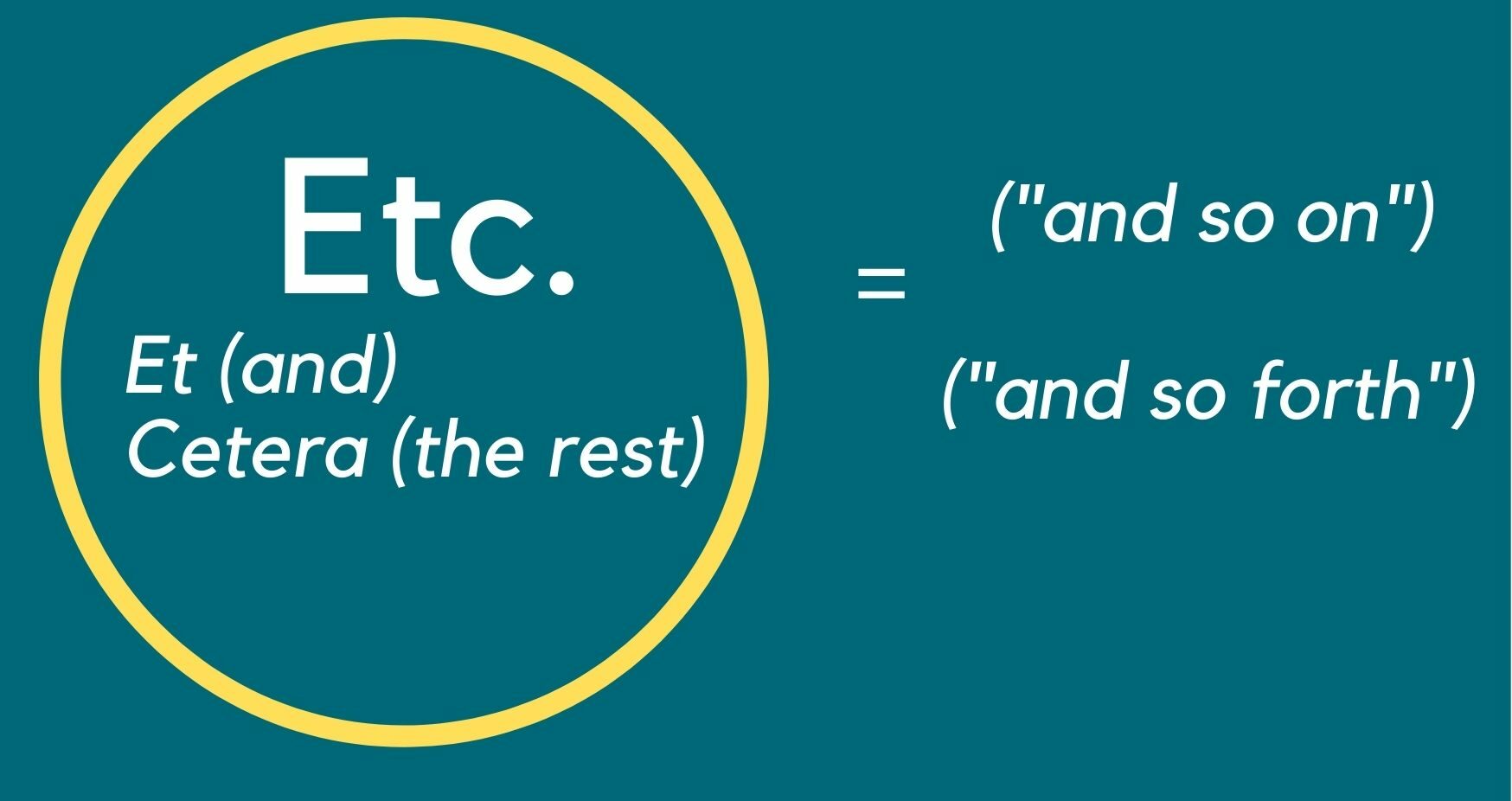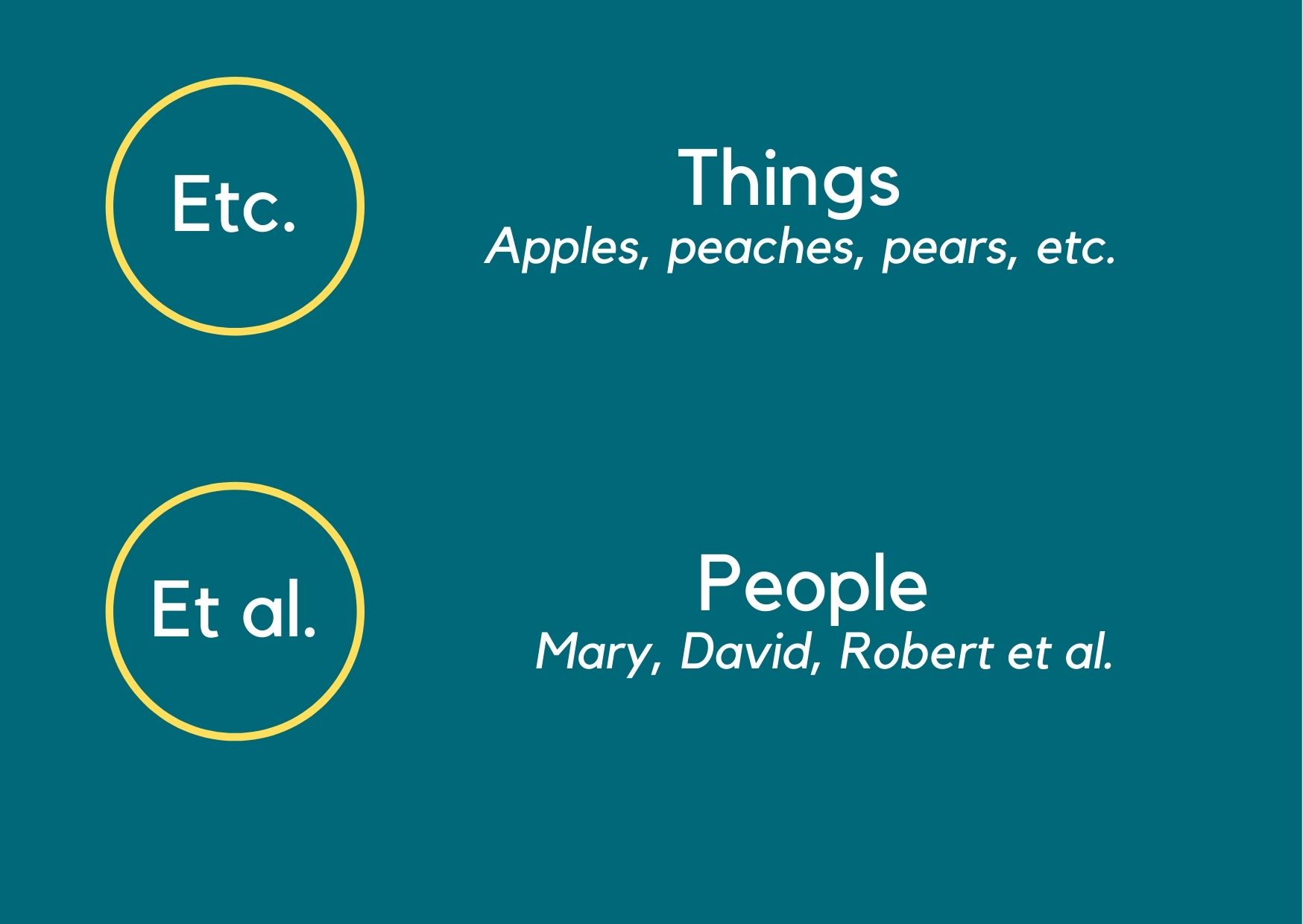What is Etc. (Et Cetera)?
- A Latin phrase, Et cetera combines the words Et, which means “and,” and Cetera, which means “the rest.”
- The abbreviation of et cetera is etc.
- You can use etc. when you present a list that you will not complete. It tells the reader that the list has other items, in addition to the ones you mention.
- The abbreviation etc. is used more often and is much more common than the whole phrase.
Using Et Cetera Correctly
If you have ever watched the musical The King and I, you may remember King Mongkut’s famous catchphrase, “Et cetera, et cetera, et cetera.” Why was he so fond of this old Latin phrase? Well, it did help him explain to his governess the rules of conduct that must be followed in his presence. He explains that she must shadow his every move. If he sits, she sits. If he knees, she must follow, “et cetera, et cetera, et cetera.” These two Latin words put together allow him to convey the totality of the message without having to describe every situation in which she must follow his lead. Pretty useful!
Synonym of Et Cetera
Et Cetera can be substituted with “and so on” and “and so forth.” Writers can also use expressions like “you get the idea” and “I can go on” to convey the same message.
 Using Et Cetera in a Sentence
Using Et Cetera in a Sentence
When writing in a formal setting such as, for example, a research paper, tread carefully with your use of et cetera. All authoritative writing guides agree that etc. has no place in formal writing. The Chicago Manual of Style states that etc. “should be avoided.” It continues to clarify that it is usually acceptable in notes, within parentheses and in tables and lists.
John B. Bremner, in his Words on Words writes, “Use it informally, if you really must.” while Theodore M. Bernstein, in his The Careful Writer maintains that the term “has no place in writing that has any literary pretensions.”
The phrase can be used only when the items not listed are of the same type as the items that are. Going back to our initial example: if King Mongkut also wanted his governess to drink when he drinks or sleep when he sleeps, he would not be able to use et cetera after saying she should sit when he sits since those actions are not in the same class as the others.
A good rule of thumb regarding the proper use of etc. is to substitute it for one of its above-mentioned synonyms, “and so forth” or “and so on.” If the list makes sense, you can use etc.
Some Important Grammar Points:
Here are a few more important rules when it comes to using etc. in a sentence:
- Always use a period after etc., even when it is midsentence. Although traditionally etc. is enclosed in commas when not found at the end of a sentence, the comma following etc. is becoming less and less common.
- Never use “and et cetera” as the first word et. is Latin for “and.” Therefore “And et cetera“ really means “And and the rest.”
- You should also never use a comma after etc. if it is at the end of the sentence.
- Do not use etc. to refer to human beings.
- Do not use etc. after giving only one example.
- Never use etc. to close a list that is introduced by such as.
- When ending a sentence with etc. only one period is required.
Let’s take a look at a few correct and incorrect examples:
Correct: Teenagers should avoid unhealthy food—potato chips, cookies, candy, etc. (The category is established and is followed by some examples.)
Incorrect: Teenagers should avoid unhealthy food—potato chips, caffeine, nicotine, etc. (This is incorrect since while certainly unhealthy, nicotine (and arguably caffeine) are no in the same category as food.)
Correct: All attendees are required to show proper documentation: passport, state-issued ID, driver’s license, etc.
Incorrect: All attendees are required to show proper documentation such as a passport, driver’s license, credit card, etc. (Never introduce a list with such as if you wish to use etc. to end the list).
Correct: You are welcome to bring all kinds of food to the party: dip, chips, wings, etc.
Incorrect: You are welcome to bring your friends to the party: Stephanie, Craig, Jason, etc. (Don’t use etc. to refer to human beings)
Etc. vs. Et al.
Since etc. is reserved for things, when referring to people, you can use et al. which comes from Latin et alii. (and other people).
Related: you can find out more about et al. in our earlier article dedicated to the expression.

Real-life Examples:
“Will his marriage ever be about love?
Love languages, exes, etc.“
Article title from the Boston Globe
“Osama bin Laden could’ve been eliminated by U.S. dark ops without invading Afghanistan, Iraq, Libya, etc. But that wouldn’t have justified redrawing the global map. So wars, occupation and chaos ensued.”
Toronto Star
“I vote, and am involved in small ways with a few activist causes, but I try not to take the circus so seriously that it distracts from the more important business of being a dad, a husband, etc.“
“Hate Inc.” by Matt Taibi
—
Want to sharpen your business writing skills? Discover our acclaimed online courses at syntaxtraining.com






